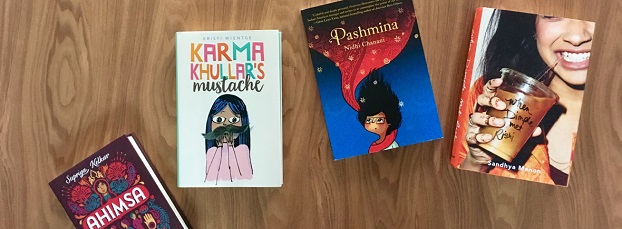
Museum educator Maya Makker is launching Nala this summer, a free three-day retreat exploring what it means to grow up as a South Asian woman in America today. Nala is for young South Asian women ages 15-19, and it will take place at Makker’s family home in Tracy, California, July 27-29, with the intent to have 10 teens participate this year and hopes of hosting multiple sessions in the future for more teens to participate. According to Makker, the goal of Nala is to create a growing network of local South Asian young women who can offer support, guidance, and friendship to one another.
The retreat’s curriculum and activities seek to explore the experiences of young South Asian women in America through pop culture, including TV, film, literature and graphic novels. If Nala sounds like a potentially life-changing and appealing three days of (inter)personal growth, inspiration, and fun for you or someone you know, read The Aerogram’s Q&A with Makker to find out more about the story behind this retreat for young women and check out the embedded previews from two books included in its curriculum. For more details on Nala, its team, story, activities, contact and/or registration information, visit: https://nalaretreat.wordpress.com/.
* * *
What kind of activities will those who attend Nala be engaging in?
Throughout the weekend, we’ll have book-club-style discussions, interactive panels, and reflective writing activities. We’ll all also cook our meals together and engage in mindfulness practices. On the last day of the retreat, interested teens and mentors will have the chance to adapt their writing into monologues and perform for the group.
What do you hope that participants will take away from the experience of attending the retreat?
I hope that the participants will leave the retreat feeling empowered, more self-assured, and supported. If this experience can give young South Asian women new reference points that help them understand and articulate their experience, I’d call the weekend a success.
How many teens will you be able to host at this year’s retreat?
For this first year, we’d like to host 10 teens. I want the group to be relatively small, so we can foster close connections between participants. I hope to run multiple sessions of the retreat in future years to accommodate more teens!
How did you decide on the name for Nala?
Since pop culture is at the core of our curriculum, I wanted to name the program after one of my favorite female icons from pop culture. I landed on Nala from The Lion King who meant a lot to me when I was a kid (and still does)! Her strength, compassion, and kindness make her one of my all-time favorite fictional characters. Without her, there would be no resolution at the end of the story.

How did you select the curriculum for the retreat?
I decided to root the curriculum for Nala in pop culture because fiction can help us talk about ourselves. As a relatively shy person, I struggle with starting conversations with people I don’t know, but I discovered early on that pop culture was my bridge to connecting with other people. Shared love for a book, band, or television show helped me develop bonds with some of my closest friends.
“…fiction can help us talk about ourselves.”
When we see how a character’s choices in a film influence the people around them or read about a teen’s relationship with her parents in a graphic novel, we can articulate our own experience in relation to what’s on the screen or page. Over the course of the retreat, we’ll be reading novels, watching films like Bend It Like Beckham, and looking at clips from television, including The Mindy Project.
There have been so many South Asian voices in mainstream American pop culture in recent years, and I am excited to dig on. Our full list of materials can be viewed on our website.
What part of Nala are you most looking forward to?
I am really looking forward to talking about books. I am an avid reader of Young Adult (YA) fiction! In recent years, there has been an influx of YA books that feature South Asian teens as leads including When Dimple Met Rishi by Sandhya Menon and Love, Hate and Other Filters by Samira Ahmed. Reading YA as an adult can invoke nostalgia and humor but I have a feeling that these novels will resonate very differently for teens, and I am excited to hear what they think.
How did your idea for the Nala retreat come about?
As an educator, I work with students from all walks of life, but I have always been most captivated by teenagers. The teens I’ve worked with are perceptive, idealistic, and unabashedly honest. They have opinions about the choices adults around them are making but aren’t often asked what they think.
Over the years at summer camps and various nonprofits, I have had the great fortune of mentoring South Asian teens. It has been a real joy to learn about their lives and consider how much — and in some cases how little — has changed in our community over the years.
“The teens I’ve worked with are perceptive, idealistic, and unabashedly honest.”
My idea for Nala came about as I got to know these teens, and I was surprised to learn that they had some of the same questions I had as an adolescent about identity, managing expectations, choosing a career, relationships, and much, much more.
My hope is that the retreat will be an environment where teens can talk, share, and connect with women who are eager to empathize and offer advice.
Because I have older sisters, I had a built-in network of knowledge when I needed an answer to questions like, “Is that a mustache?”, but there are still times today when I think back about how much more comfortable I could have been in my own skin as a teen if I had a place where I could talk about my everyday experience with people who could deeply relate.
Why was it important for you to found Nala?
Growing up in the Central Valley, I didn’t know a lot of South Asian women my own age beyond my family. When I moved into my college dorm, I was shocked to see that the person living two doors down from me was South Asian, as was the person around the corner, and the seven people across the hall.
I made my first South Asian friends that year and for the first time, was in an environment where my difference made me part of the majority, allowing me to explore other parts of my identity. I came to see how comforting it is to have a network of people who didn’t need explanations when I traveled home for a family party or needed to find a place to get my eyebrows threaded (ouch).
“My vision for Nala is to bring these narratives into the open…”
Today, on days when the 24-hour news cycle is in full force and immigrant narratives are brought to the forefront of political discourse, I know there are peers I can talk to who have an acute understanding of how the day’s events will make me feel.
There is an unspoken but common experience of being a South Asian in America that we can all relate to. My vision for Nala is to bring these narratives into the open and draw on what binds us together to create a growing community of support.
How did your experiences with mentorship, as a mentor or mentee, influence the development of Nala?
I was definitely inspired by my experiences as a mentor and mentee when I developed Nala. The mentor-mentee relationship can be a grounding force in an individual’s life. The women I have been lucky to call mentors have been my role models, support system, and advocates.
When I mentor students, I take the responsibility very seriously because I know that it is a bond that can last for years. I hope the social environment at Nala fosters the development of meaningful bonds between the teens and our team that can continue to grow after the retreat ends.
Are there any tips or advice you would give to those who may be interested in signing up for the retreat?
While we have a set program and curriculum for the weekend, the conversations will really be shaped by what the teens bring to the table. Even if you don’t think you have a lot to say or are used to listening more than talking, there is a place for you at our retreat. Above all, we want to create a space where teens can forge ties with one another and our mentors. If that sounds enriching to you, I’d encourage you to join us! We are happy to answer questions about the program via email at nalaretreat@gmail.com.
* * *
Pavani Yalamanchili is an editor at The Aerogram. Find her on Twitter at @_pavani, and follow The Aerogram at @theaerogram or on Facebook.












